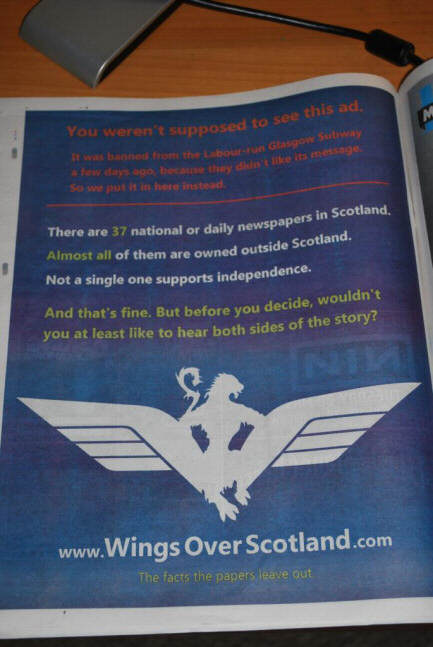 The Judge
RAVES!
The Judge
RAVES!
Date: 28/03/14
The McStreisand Effect
I remarked back here on the hopelessly biased media coverage of the Independence referendum in Scotland, even (or particularly) on the part of the media which are, at least nominally, based in Scotland.
The sorts of things they get up to include, inter alia, refusing to give any due coverage to statements made by business leaders, experts on European Community law and other knowledgeable folk which either support independence or state that it would be no big deal in practical terms in any case, whilst splashing all over their pages the slightest remark made by people who either have no expertise or qualifications in the relevant subject or who are simply seeking to advance their own agenda which - so the media claim - 'undermines' the argument for Scotland's national freedom.
There are other ways in which the 'No' campaign and its placemen can influence coverage, and some of them are downright sinister. Just one example from this week will suffice.
The pro-independence website Wings Over Scotland recently raised a large sum of money from its supporters to buy advertising space on Glasgow's underground train network. The advert duly appeared on the trains on Tuesday last:

They appeared on Tuesday. But that was the only day that they appeared. In response to 'complaints' (the nature, name and numbers of which have not been disclosed), the ads were removed from all of Glasgow's underground trains by Wednesday morning.
The complainant(s), whoever or whatever they were, stated that the ads were 'political', and Strathclyde Partnership for Transport (SPT) who run the subway system quickly agreed, hence the takedown.
Now, read the poster again. Is anything in it really 'political'? It merely states a sequence of proven facts about the nature of the ownership of Scotland's newspapers and invites people to visit a website where they might get more - and rather more accurate - information about the independence debate.
So why were Wings' (fully paid for) adverts pulled on such a flimsy pretext? Well, it might help if you understand that:
- SPT is a public quango full of political appointees
- No fewer than eleven members of its executive are Glasgow Labour councillors
- One former member of the executive is Archie Graham, who is the husband/partner of one Johann Lamont
- Johann Lamont is currently the Regional Branch Manager (Scotland) of the Labour Party, a party even more vindictively and violently pro-Unionist than the Tories
- No fewer than three Glasgow Labour MPs have proudly gone public in recent weeks to state that even if they were convinced that independence (or even substantial further devolution) was in their constituents' best interests, they would still vote against it.
So, in other words, the only thing about all this which could reasonably called 'political' was the decision to yank the ads off the trains.
That didn't stop Severin Carrell (whose job title is 'Scotland correspondent' of The Guardian; that is, their 'go-to' man for pro-Union bias) from whining that the ad was an 'attack on the Scottish media'. You bet your expense account that it was, Sevvy baby. And thoroughly deserved, too.
The shit, I am glad to say, immediately hit the fan. SPT blamed their advertising agency for passing the ad, the agency responding in kind. The news that the posters had been pulled went viral online to such a degree that even the BBC had to cover it. It also garnered reports on - and widespread criticism from - reputable media-news websites.
The sewage farm then struck the windmill in mid-sails when - the very next day - SPT seemed to have no qualms or reservations about allowing a virulently anti-independence diatribe to be freely distributed in copies of the Metro newspaper on the subway system.
Stuart Campbell - owner of Wings Over Scotland - having got his money back from SPT, clearly decided "If ye cannae beat 'em, join 'em". And so it was that on Friday morning, this was to be found in every copy of Metro distributed on the Glasgow underground - and further afield:

(Photograph: Kevin Kenny)
So now, thanks to the bungling, arrogant numpties of the 'No' campaign (because it must have been one of them who made the initial complaint), thousands more people in central Scotland have seen the advertisment than would have been the case if it had merely gone round and round under the streets of Glasgow for a few days. And more and more people will have been made aware of the desperate lengths the pro-Union camp will go to prevent them from finding out inconvenient things, like the truth.
Stuart Campbell - who is hinting that other cities in Scotland will see the same ads shortly - has played a canny game, and deserves praise for taking on the enemy in a most constructive and effective way. If the independence campaign fails in September, then it won't be for lack of effort on his part.


 The Judge
RAVES!
The Judge
RAVES!











